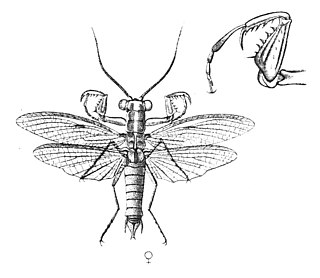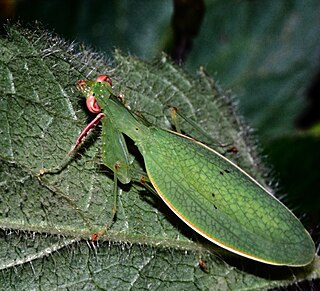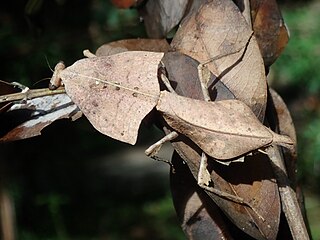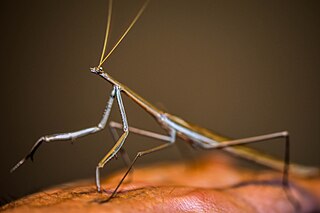
The mantis family Metallyticidae consists of a single small genus, Metallyticus, living mostly in South-East Asia. The species are dark, somewhat flattened and cockroach-like, often with a cuticle that is reflective and metallic in appearance.

Mantoida is a genus of mantis in the family Mantoididae.

Eremiaphilidae is a small Old World family of praying mantids, based on the type genus Eremiaphila. As part of a major revision of mantid taxonomy, this family now contains the subfamily Tarachodinae, which includes tribes and genera previously placed in the now obsolete Tarachodidae.

Iris is a genus of praying mantis found in Africa, Asia, and Southern Europe with one species, Iris oratoria, being introduced to North America in the south-western United States.

Rhombodera is a genus of praying mantises native to Asia and possessing common names such as shield mantis, hood mantis, and leaf mantis because of their extended, leaf-like thoraxes.

Acontista is a genus of mantises in the family Acanthopidae.

Acromantis is a genus of Asian praying mantids in the subfamily Acromantinae of the family Hymenopodidae.
Bantiella is a genus of mantis in the family Thespidae.
Toxoderidae is a family of praying mantises.

Mantoididae is a family of order Mantodea which contains Neotropical species of praying mantises from tropical North and South America. The family was formerly represented by the sole genus Mantoida, however the genus Paramantoida was described in 2014 and Vespamantoida in 2019. The family differs from the closely related Chaeteessidae in having an apical claw on the fore tibiae which are also less curved. Males have ocelli and a cylindrical body shape, unlike the dorsoventrally flattened Chaeteessidae. The cerci are also shorter.
Fulcinini is an Australian praying mantis tribe in the subfamily Fulciniinae.
Calofulcinia elegans is a species of praying mantis in the family Nanomantidae. It is found in New Guinea.
Oligonyx is a genus of mantises in the family Thespidae.

The Hierodulinae are a subfamily of praying mantids, originally used by Brunner von Wattenwyl. It was restored as part of a major revision of mantid taxonomy, and now contains genera previously placed elsewhere in the family Mantidae.

The Nanomantidae are a new (2019) family of praying mantises, based on the type genus Nanomantis. As part of a major revision of mantid taxonomy, genera and tribes have been moved here, substantially replacing the old family Iridopterygidae.

The Deroplatyidae are a new (2019) family of praying mantises, based on the type genus Deroplatys. As part of a major revision of mantis taxonomy, the subfamily Deroplatyinae has been moved here from the previously-structured family Mantidae.

The Leptomantellidae are a new (2019), small family of praying mantids, based on the type genus Leptomantella. As part of a major revision of mantid taxonomy, genera have been moved here from the Caliridinae in the now obsolete family Tarachodidae.

Hoplocoryphidae is a newly erected (2019) family of praying mantids, based on the type genus Hoplocorypha. As part of a major revision of mantid taxonomy, genera have been moved here from the subfamily Hoplocoryphinae of the previously polyphyletic family Thespidae. The family Hoplocoryphidae is the only member of superfamily Hoplocoryphoidea. Species in this family have been recorded from tropical Africa.

The Rivetinidae are a family of praying mantids, based on the type genus Rivetina. As part of a major revision of mantid taxonomy, this family contains many genera moved from Miomantinae: tribe Rivetinini; some genera previously placed there have now been moved to the new families Deroplatyidae and Chroicopteridae. The new placement of this taxon is in the superfamily Eremiaphiloidea and infraorder Schizomantodea.













